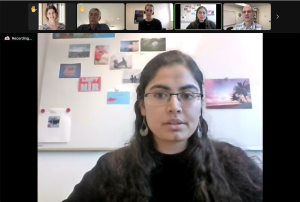 This conversation was led by Hinrich Schulenburg, Professor in the Antibiotic Resistance Evolution Group at the Max Planck Institute for Evolutionary Biology, and Aditi Batra, PhD Student at the Max Planck Institute for Evolutionary Biology. Evolutionary processes are responsible for the current antibiotic crisis. Surprisingly, they are usually ignored during design of novel therapy, which mainly focuses on finding new drugs. In general, bacteria show an enormous potential to adapt to constant environments, even if extreme such as those defined by many antibiotics. Adaptation may however be more difficult, if conditions change fast. Therefore, rapid fluctuations in the application of drugs may enhance pathogen extinction and minimize resistance evolution. To date, such fast fluctuations are usually not considered for antibiotic therapy. Our lab uses evolution experiments in combination with genomics, functional genetics, mathematical modelling, and also analysis of clinical material to explore new evolution-informed ideas for antibiotic therapy. We will present some of our recent results with the model pathogen Pseudomonas aeruginosa that highlight the particular potency of fast sequential treatments, especially when these exploit evolutionary trade-offs like collateral sensitivity or transient physiological responses such as cellular hysteresis. Our work points to new treatment designs, which may help us to control the emergence and spread of antibiotic resistance.
This conversation was led by Hinrich Schulenburg, Professor in the Antibiotic Resistance Evolution Group at the Max Planck Institute for Evolutionary Biology, and Aditi Batra, PhD Student at the Max Planck Institute for Evolutionary Biology. Evolutionary processes are responsible for the current antibiotic crisis. Surprisingly, they are usually ignored during design of novel therapy, which mainly focuses on finding new drugs. In general, bacteria show an enormous potential to adapt to constant environments, even if extreme such as those defined by many antibiotics. Adaptation may however be more difficult, if conditions change fast. Therefore, rapid fluctuations in the application of drugs may enhance pathogen extinction and minimize resistance evolution. To date, such fast fluctuations are usually not considered for antibiotic therapy. Our lab uses evolution experiments in combination with genomics, functional genetics, mathematical modelling, and also analysis of clinical material to explore new evolution-informed ideas for antibiotic therapy. We will present some of our recent results with the model pathogen Pseudomonas aeruginosa that highlight the particular potency of fast sequential treatments, especially when these exploit evolutionary trade-offs like collateral sensitivity or transient physiological responses such as cellular hysteresis. Our work points to new treatment designs, which may help us to control the emergence and spread of antibiotic resistance.


Resources discussed:
- Roemhild and Schulenburg 2019, “Evolutionary ecology meets the antibiotic crisis: Can we control pathogen adaptation through sequential therapy?”
- Batra et al. 2021, “High potency of sequential therapy with only beta-lactam antibiotics”

Comments are closed, but trackbacks and pingbacks are open.